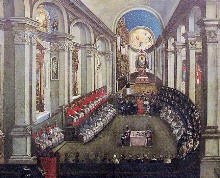
The Canons And Decrees Of The Council Of Trent
THE TRUE AND CATHOLIC DOCTRINE, TOUCHING THE SACRAMENT OF ORDERS, IN CONDEMNATION OF THE ERRORS OF OUR TIME, DECREED AND PUBLISHED BY THE HOLY SYNOD OF TRENT, IN THE SEVENTH SESSION
CHAPTER I
On the Institution of the Priesthood of the New Law
Sacrifice and priesthood are, by the ordinance of God, in such wise conjoined, as that both have existed in every law. Whereas, therefore, in the New Testament, the Catholic Church has received, from the institution of our Lord, the holy visible sacrifice of the Eucharist; it must of necessity also be confessed, that there is, in that [Church], a new, visible, and external priesthood, into which the old has been translated. And the sacred Scriptures show, and the tradition of the Catholic Church has always taught, that this was instituted by the same Lord our Saviour, and that to the apostles, and to their successors in the priesthood, the power was delivered of consecrating, offering, and administering His Body and Blood, as also of remitting and of retaining sins.
CHAPTER II
Touching the Seven Orders
But whereas the ministry of so holy a priesthood is a divine thing; to the end that it might be exercised more worthily, and with greater veneration, it was meet that, in the most well-ordered arrangement of the church, there should be several and diverse orders of ministers, to minister unto the priesthood, by virtue of their office, [orders] so distributed as that those who were already marked with the clerical tonsure should ascend through the lesser to the greater orders. For the sacred Scriptures make open mention not only of priests, but also of deacons; and teach, in the most weighty terms, what things are especially to be attended to in the ordination thereof; and, from the very beginning of the Church, the names of the following orders, and the proper ministrations of each one of them, to wit, those of subdeacon, acolyth, exorcist, reader, and door-keeper, are known to have been in use; though not of equal rank: for the subdeaconship is classed amongst the greater orders by the fathers and sacred councils, wherein also we very often read of the other inferior orders.
CHAPTER III
That Orders is truly and properly a Sacrament
Whereas, by the testimony of Scripture, by apostolic tradition, and the unanimous consent of the fathers, it is clear that grace is conferred by sacred ordination, which is performed by words and outward signs, no one ought to doubt that Orders is truly and properly one of the seven sacraments of the holy Church. For the apostle says, I put thee in remembrance that thou stir up the grace of God, which is in thee by the putting on of my hands. For God hath not given us the spirit of fear; but of power, and of love, and of sobriety.
CHAPTER IV
Touching Ecclesiastical Hierarchy and Ordination
But, inasmuch as in the sacrament of Orders, as also in Baptism and Confirmation, a character is imprinted, which can neither be effaced nor taken away; the holy synod with reason condemns the opinion of those, who assert that the priests of the New Testament have only a temporary power; and that those who have once been rightly ordained, can again become laymen, if they do not exercise the ministry of the word of God. But if any one affirm that all Christians indiscriminately are priests of the New Testament, or that are all mutually endowed with an equal spiritual power, he seems to do nothing but confound the ecclesiastical hierarchy, which is as an army set in array; as if, contrary to the doctrine of the blessed Paul, all were apostles, all prophets, all evangelists, all pastors, all doctors. Wherefore, the sacred and holy synod declares that, besides the other ecclesiastical degrees, bishops, who have succeeded unto the place of the apostles, principally belong to this hierarchical order; that they are placed, as the same apostle says, by the Holy Ghost, to rule the Church of God; that they are superior to priests; confer the sacrament of Confirmation; ordain the ministers of the Church; and that they are able themselves to perform very many other things; over which functions the rest of an inferior order have no power. The sacred and holy synod further teaches, that, in the ordination of bishops, priests, and of the other orders, neither the consent, nor vocation, nor authority, whether of the people, or of any secular power or magistrate soever, is required in such wise as that, without this, the ordination is invalid: yea rather it doth decree, that all those who, being only called and instituted by the people, or by the secular power and magistrate, ascend to the exercise of these ministrations, and those who of their own rashness assume them to themselves, are not ministers of the Church, but are to be accounted as thieves and robbers, who have not entered by the door. These are the things which it hath seemed good to the sacred synod to teach the faithful of Christ, in general terms, touching the sacrament of Orders. But it hath resolved to condemn things contrary thereunto, in express and specific canons, in the manner which follows; to the end that all men, with the assistance of Christ, using the rule of faith, may, amidst the darkness of so many errors, more easily be able to recognize and to hold Catholic truth.
Copyright ©1999-2023 Wildfire Fellowship, Inc all rights reserved

 Keep Site Running
Keep Site Running